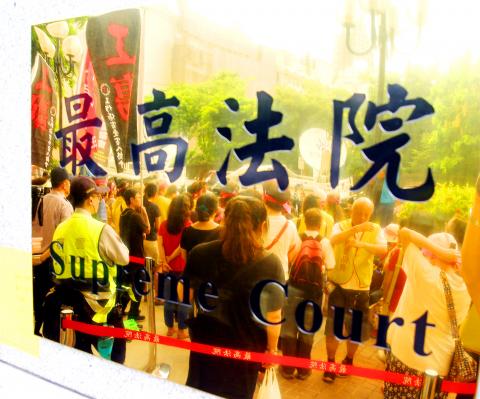The Legislative Yuan yesterday passed amendments to the Court Organic Act (法院組織法) and the Administrative Court Organization Act (行政法院組織法), making way for the establishment of collegiate grand chambers to resolve a recurring issue of courts at different levels issuing conflicting rulings in a case.
The amendments stipulate that the Supreme Court is to assemble a civil grand chamber and a criminal grand chamber of 11 judges each, while the Supreme Administrative Court is to have a grand chamber comprised of nine judges, with the chief justice of each court serving as the presiding judge of their respective chambers.
To ensure fairness in judgements by the grand chambers, the number of division chief judges doubling as chamber judges must not exceed half of each chamber’s makeup, one amendment says.

Photo: CNA
Should the legal basis invoked by either court contradict that cited by a high court, resulting in contradictory rulings on a case, the superior court should address the dispute by submitting a request for the corresponding grand chamber to state its opinions, the amendments say.
That grand chamber must issue a ruling on a dispute within 30 days, the amendments say, adding that while the grand chamber’s verdict is not the final ruling in a case, it should serve as the basis on which the presiding court must base its final verdict.
Recognizing that litigants have the most crucial role in a lawsuit, the amendments afford them the right to request that the Supreme Court or the Supreme Administrative Court exercise its authority to file an arbitration motion with a grand chamber.
Democratic Progressive Party (DPP) Legislator Chou Chun-mi (周春米), cochair of the legislature’s Organic Laws and Statutes Committee, said that the amendments are expected to lower the occurrence of courts passing down conflicting rulings, which she called a much maligned issue that has plagued the nation’s judiciary.
Additional reporting by Peng Wan-hsin

Taiwan has received more than US$70 million in royalties as of the end of last year from developing the F-16V jet as countries worldwide purchase or upgrade to this popular model, government and military officials said on Saturday. Taiwan funded the development of the F-16V jet and ended up the sole investor as other countries withdrew from the program. Now the F-16V is increasingly popular and countries must pay Taiwan a percentage in royalties when they purchase new F-16V aircraft or upgrade older F-16 models. The next five years are expected to be the peak for these royalties, with Taiwan potentially earning

STAY IN YOUR LANE: As the US and Israel attack Iran, the ministry has warned China not to overstep by including Taiwanese citizens in its evacuation orders The Ministry of Foreign Affairs (MOFA) yesterday rebuked a statement by China’s embassy in Israel that it would evacuate Taiwanese holders of Chinese travel documents from Israel amid the latter’s escalating conflict with Iran. Tensions have risen across the Middle East in the wake of US and Israeli airstrikes on Iran beginning Saturday. China subsequently issued an evacuation notice for its citizens. In a news release, the Chinese embassy in Israel said holders of “Taiwan compatriot permits (台胞證)” issued to Taiwanese nationals by Chinese authorities for travel to China — could register for evacuation to Egypt. In Taipei, the ministry yesterday said Taiwan

Taiwan is awaiting official notification from the US regarding the status of the Agreement on Reciprocal Trade (ART) after the US Supreme Court ruled US President Donald Trump's global tariffs unconstitutional. Speaking to reporters before a legislative hearing today, Premier Cho Jung-tai (卓榮泰) said that Taiwan's negotiation team remains focused on ensuring that the bilateral trade deal remains intact despite the legal challenge to Trump's tariff policy. "The US has pledged to notify its trade partners once the subsequent administrative and legal processes are finalized, and that certainly includes Taiwan," Cho said when asked about opposition parties’ doubts that the ART was

If China chose to invade Taiwan tomorrow, it would only have to sever three undersea fiber-optic cable clusters to cause a data blackout, Jason Hsu (許毓仁), a senior fellow at the Hudson Institute and former Chinese Nationalist Party (KMT) legislator, told a US security panel yesterday. In a Taiwan contingency, cable disruption would be one of the earliest preinvasion actions and the signal that escalation had begun, he said, adding that Taiwan’s current cable repair capabilities are insufficient. The US-China Economic and Security Review Commission (USCC) yesterday held a hearing on US-China Competition Under the Sea, with Hsu speaking on